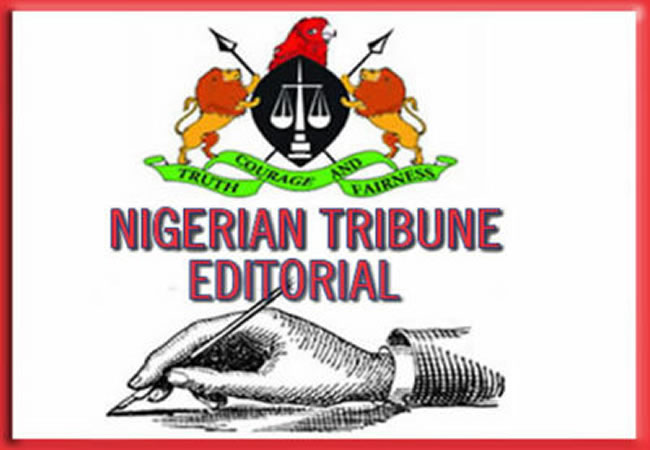THE recent incident that unfolded on Friday, April 12, in which about 18 suspected agitators claiming to be of the Yoruba Nation leaning attempted to seize the Oyo House of Assembly, sent ripples of concern throughout the community. Dressed in army camouflage and armed with pump action guns, these masked individuals occupied strategic positions within the vicinity of the Oyo State Government Secretariat, creating an atmosphere of tension, uncertainty and fear. However, the swift response of security agents led by the military helped in quelling the disturbance and ensuring the safety of the area. The decisive actions taken by the security forces, including the use of tear gas to disperse the agitators and the subsequent arrests made, demonstrate a commitment to upholding law and order in the face of such challenges.
Despite their arrest, some of the Yoruba Nation agitators displayed defiance and showed no remorse for their intrusion into the secretariat. When paraded by the police the subsequent Monday, some of them maintained that their actions were legitimate and followed the proper procedure. Alabi Ogundeji, a 55-year-old lecturer who claimed to work at the Federal College of Education (Special) in Oyo, emphasised that the Yoruba people are a distinct nation and had taken lawful measures towards self-determination. He pointed to a referendum, petitions signed by certain Yoruba people, and official notifications to Yoruba-speaking states as evidence of their rightful cause. Similarly, Ademola Adeniyi, a 29-year-old phone repairer, expressed dissatisfaction with Nigeria’s current situation, underscoring the everyday struggles by ordinary citizens to make ends meet. He mentioned that their leader had promised to address these issues through their movement.
In recent years, Nigeria has experienced a surge in secessionist movements, particularly in regions of the South-East and South-West. These movements advocate the independence of specific ethnic groups within the country, citing grievances related to marginalisation, socio-economic disparities, governance issues, and cultural identity. Notably, groups like the Indigenous People of Biafra (IPOB) in the South-East and the Yoruba Nation agitators in the South-West have emerged as prominent advocates of self-determination. The resurgence of these movements underscores deep-rooted historical and contemporary tensions that pose challenges to Nigeria’s unity and stability. The government’s response to these secessionist aspirations, particularly under the Buhari administration, which faced accusations of “fulanising” Nigeria, has been intricate and contentious. Moving forward, it is imperative for the current government to carefully handle these complexities. Balancing the requirements of preserving national integrity with addressing legitimate grievances is paramount to fostering inclusivity and unity within the country. By adopting measures that promote dialogue, inclusivity and respect for diversity, the government can work towards addressing the underlying issues that fuel secessionist sentiments while upholding the principles of national unity and cohesion.
The recent incident in Ibadan is utterly senseless and worrisome. Such occurrences constitute a risk to the peace and unity of the Nigerian society. But Nigeria requires restructuring, not war. If the people of Nigeria choose to pursue separatist paths, it should be done in adherence to international legal standards. The events in Ibadan amount to a declaration of war against a lawful government and must be met with severe consequences. However, we call on governments at all levels to recognise the need to address the grievances of the secessionists. The discontent stems from perceived injustices and socio-economic disparities that have characterised governance in the country over the years. As government officials reflect on that unfortunate incident ,we call on them to promote dialogue, mutual understanding and unity in the Nigerian society. By standing together in solidarity against violence and discord, citizens can forge a path towards a future marked by peace, inclusivity and progress. Granting more autonomy to states and regions can address concerns of marginalisation and promote a sense of local ownership and decision-making. By decentralising power and resources, the government can empower regions to address their unique challenges and aspirations.
Nigerians must remain vigilant and resolute in the efforts to protect the democratic values that form the foundation of the Nigerian society, and as expressed in the 1999 Constitution. Citizens must avoid the path of violence and work together to overcome the challenges of injustice, inequity and oppression in governance, economy and society. The country can only emerge stronger when citizens are united in the shared resolve to uphold democracy, peace and justice. Acknowledging the diversity of peoples and ensuring inclusion, citizens must stand united in the commitment to upholding the principles of democracy, freedom of expression, and peaceful coexistence. During times of economic turmoil and widespread hardship impacting the common person, it is essential for citizens to unite in denouncing acts of violence and aggression. Government officials play a crucial role in demonstrating solidarity through frugal behaviour and public accountability. Without such display of concern and responsibility, there is a risk of fostering a sense of hopelessness within the society, potentially driving individuals towards extremist groups. By promoting transparency, accountability and empathy, government leaders can help cultivate a sense of trust and stability, thereby mitigating the attraction of radical ideologies and fostering a more resilient and inclusive society.
Engaging in meaningful dialogue with stakeholders, including secessionist groups, civil society organisations and political leaders, is essential for constitutional reforms. Inclusive consultations can help identify key issues, build consensus, and develop solutions that accommodate diverse interests while upholding national unity.
ALSO READ: One feared killed, two others injured in LAUTECH students’ clash
